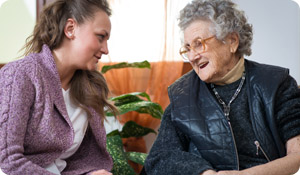
If a loved one has a heart attack, you may find yourself in the position of primary caregiver. And in that role, you may wear many hats: housekeeper, coach, companion, care coordinator, troubleshooter, and financial manager, to name just a few. Here’s how to juggle these new responsibilities.
The Job At Hand
Your tasks as caregiver may include everything from shopping, cooking, and cleaning to providing transportation, coordinating health care, and dealing with insurance matters. And if your charge has to make lifestyle changes such as getting more exercise or losing weight, you may find yourself in the position of cheerleader, too. You may even become a temporary health coach, monitoring medications, helping with medical decisions, coordinating appointments, and generally assessing health status.
Providing Emotional Support
One of your key roles may be to provide emotional support: Almost half of all heart attack victims suffer from loss of self-esteem and self-worth. Additionally, many heart patients are fearful; this may result from anguish over the fragility of their health or the need to make significant lifestyle changes. As a primary caregiver and coach, you can provide comfort and support, and be there to contact other family and friends, or health care providers if necessary—for instance, if you notice significant or relentless changes in mood.
"Patients need a lot of personal courage and confidence to emerge from a cardiac event," says William A. Tansey III, MD, FACC, a cardiologist at Summit Medical Group in NJ. "A close circle of family and friends that includes the caregiver helps to restore that sense of self."
Expert Advice for Caregivers of Heart Patients
To be an effective caregiver,
- Learn all you can about heart disease. This will help you know what to expect, feel less anxious about making decisions, and be a more effective caregiver.
- Help your recovering friend or relative remain as independent as possible. This will make your job easier, too.
- Look after yourself. This is your most important job, since caregivers can actually be at higher than average risk of developing heart disease and depression—plus a host of other issues resulting from the physical, emotional, and sometimes financial strain of taking care of someone else. Be sure you have a support system of friends and relatives, including some you can count on to share in caregiving responsibilities.
"It takes a team to work together to help a heart patient," says Tansey. "Consider yourself an essential member of that team."
William A. Tansey III, MD, reviewed this article.
Sources
"Family Cardiac Caregivers May Have Higher Heart Disease Risk." Columbia University. 12 March 2008. Accessed 6 June 2014.
Mosca L, Mochari-Greenberger H, Aggarwal B, et al. "Patterns of Caregiving Among Patients Hospitalized with Cardiovascular Disease." Journal of Cardiovascular Nursing 2011 Jul-Aug; 26(4): 305-311. Accessed 6 June 2014.





